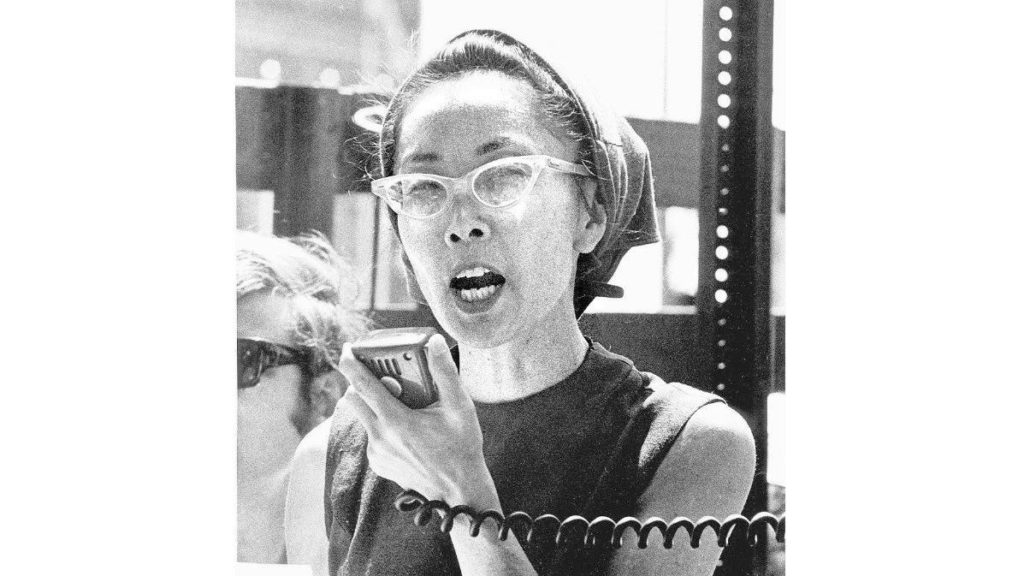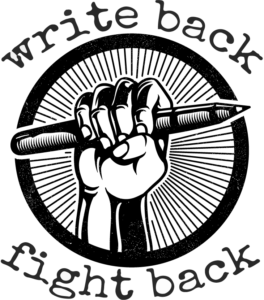 By Jenn Fang (@reappropriate), Reappropriate
By Jenn Fang (@reappropriate), Reappropriate
 In the grainy black-and-white image – a blurred photocopy of a photocopy of the original photograph – a spritely Japanese American woman stands poised in defiance. She faces an unseen crowd, her head adorned with a headscarf and her eyebrows knitted with passion behind a pair of pointed cat-eye spectacles. The image catches her mid-speech, one hand holding a bullhorn microphone to her mouth.
In the grainy black-and-white image – a blurred photocopy of a photocopy of the original photograph – a spritely Japanese American woman stands poised in defiance. She faces an unseen crowd, her head adorned with a headscarf and her eyebrows knitted with passion behind a pair of pointed cat-eye spectacles. The image catches her mid-speech, one hand holding a bullhorn microphone to her mouth.
This image of Asian American revolutionary Yuri Kochiyama was my first introduction to our peoples’ history of radical organizing and social justice activism. I remember the emotions it evoked in me: I was awed by the sight of a strong, unyielding Asian American woman and thought leader; I was proud of this historic evidence of Asian Americans radicalism; and, I was angered that this history had been not been made known to me sooner.
Contrary to the trappings of the Model Minority Myth – a stereotype of meek, apolitical Asian Americana rooted in anti-blackness – revolution is woven into our DNA. Our ancestors were not quiet in the face of racism: our history is replete with examples of Asian Americans fighting back against white supremacy and systemic injustice. We were not silent witnesses to American racism; we were active participants in a multi-racial movement against white supremacy.
Often, that Asian American revolutionary spirit took the form of the written word.
Throughout our history, Asian Americans have written to push back against the forces that would silence our politics, invisibilize our history, and co-opt our identity in service of white supremacy. Against a white supremacist backdrop, our writing becomes radical self-expression: from the poems etched into the walls of Angel Island by imprisoned Chinese American immigrants to Carlos Bulosan’s haunting autobiography describing the nomadic and marginalized life of Filipino American seasonal workers in the early nineteenth century; from academic essays establishing the groundwork for Asian American feminism to anthologies such as Screaming Monkeys, Dragon Ladies, Aiiieeeee, and Legacy to Liberation; from ‘zines such as Gidra to blogs like Angry Asian Man and Reappropriate – we write to claim and reclaim our voice. Our most prominent figures – Yuri Kochiyama, Grace Lee Boggs, and Fred Ho, among others – were all prolific writers, and the writing by these and other Asian American revolutionaries serve as a living record of Asian American radical thought. Kochiyama, for example, paired the passion of her street protests with extensive writing on topics ranging from Asian American feminism to Black liberation to the urgent need to free political prisoners, incarcerated both domestically and abroad.
Asian Americans write back to fight back. Often, our choice to write in English – a native Asian American tongue that white supremacy would nonetheless deny our claim to (“but, where are you really from?”) – itself feels defiant; other times, we write in the language of our Asian ancestors as a deliberate challenge to the Eurocentrism of American political thought.
Nearly two decades into the twenty-first century, the need for Asian Americans to express ourselves is more pressing than ever. Overt nativism, xenophobia, and anti-blackness is again at the fore, and racial violence is once more our new normal. State violence routinely claims the lives of Black people, and Asian Americans cannot afford to sit in silence in the face of this surging racial hatred. As in the late nineteenth and twentieth century, Asian Americans must once again join the fight against racial hate. We must use our words and our actions to challenge the forces of racism, white supremacy, and anti-blackness that threaten the lives of Black people and other people of color.
For those of us whose work takes the form of writing, our words help actualize our peoples’ opposition as Asian Americans against systemic racism and other forms of social injustice. For a people historically silenced in the racial discourse of America, our writing enables us to speak in our own voice and to tell our own stories; and so, to finally be heard.
Write Back, Fight Back is a new weekly essay series – sponsored by 18MillionRising, Asian Americans Advancing Justice, and Reappropriate – that invites Asian Americans to use the written word to explore topics of white supremacy, anti-blackness, and Asian American identity politics. Collectively, we ask: What is the Asian American story in the fight against white supremacy? Our answers to this question are understandably broad, and reflect the diverse ways in which white supremacy intersect with the daily lives of Asian Americans. The topics that Write Back, Fight Back’s writers tackle include gun violence, mental health, immigration, and hegemonic masculinity among others. In all cases, we explore what it means to be an Asian American pitted against white supremacy in the 21st century.
For too long, Asian Americans have been relegated to the margins of anti-racist discourse. In considering the importance of this essay series to the politics of the moment, I am reminded of the words of M. Evelina Galang in the introduction of Screaming Monkeys: “There are historians, elders in our community, who have been building a record of evidence, who speak to the presence of Asians in America – isn’t it time to incorporate these stories into the larger autobiography that is America?”
Write Back, Fight Back endeavors to do just that.
Jenn Fang is founder of Reappropriate.co, one of the web’s oldest and most popular blogs dedicated to Asian American and Pacific Islander feminism, pop culture, and politics. Her writing has been featured in several outlets including Quartz, BlogHer, Asian Pacific Americans for Progress, Asian Americans for Obama, Angry Asian Man, and Northwest Asian Weekly.
Write Back, Fight Back (#WriteBackFightBack) is a weekly essay series by emerging Asian American writers on topics of racial and social justice. New essays will appear every Thursday.
